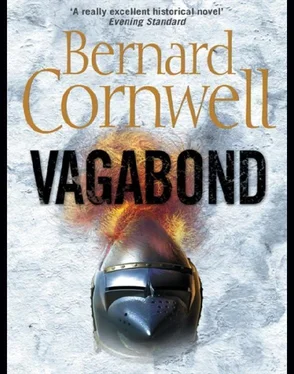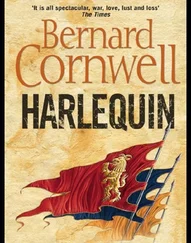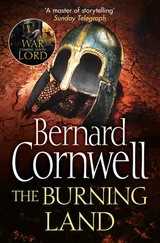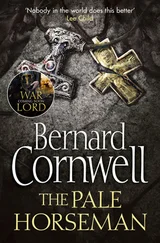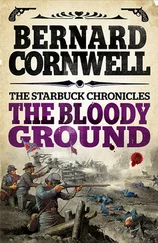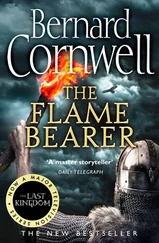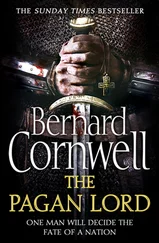By God, he thought, but it hurt to run from an enemy, yet there was no shame in two hundred men fleeing six or seven hundred. And when the fog lifted there could be a proper battle, a murderous clash of men and steel, and Sir William would teach these bastard English how to fight. He kicked his borrowed horse on, intent on carrying news of the English to the rest of the Scottish army, but then saw an archer lurking in a hedge. A woman and a priest were with the man and Sir William put a hand to his sword hilt and thought about swerving aside to take some revenge for the arrows that had ripped into his forage party, but behind him the other Englishmen were shouting their war cry: 'St George! St George!' and so Sir William left the isolated archer alone. He rode on, leaving good men on the autumn grass. They were dead and dying, wounded and frightened. But he was a Douglas. He would come back and he would have his revenge. A rush of panicked horsemen galloped past the hedge where Thomas, Eleanor and Father Hobbe crouched. Half a dozen horses were riderless while at least a score of others were bleeding from wounds out of which the arrows jutted with their white goose feathers spattered red. The riders were followed by thirty or forty men on foot, some limping, some with arrows stuck in their clothes and a few carrying saddles. They hurried past the burning cottages as a new volley of arrows hastened their retreat, then the thump of hooves made them look back in panic and some of the fugitives broke into a clumsy run as a score of mail-clad horsemen thundered from the mist. Great clods of wet earth spewed up from the horses' hooves. The stallions were being curbed, forced to take brief steps as their riders took aim at their victims, then the spurs went back as the horses were released to the kill and Eleanor cried aloud in anticipation of the carnage. The heavy swords chopped down. One or two of the fugitives dropped to their knees and held their hands up in surrender, but most tried to escape. One dodged behind a galloping horseman and fled towards the hedge, saw Thomas and his bow and turned straight back into the path of another rider who drove the edge of his heavy sword into the man's face. The Scotsman went onto his knees, mouth open as though he would scream, but no sound came, only blood seeping between the fingers that were clasped over his nose and eves. The horseman, who had no shield or helmet, turned his stallion and then leaned out of the saddle to chop his sword into his victim's neck, killing the man as if he were a cow being pole-axed and that was oddly appropriate because Thomas saw that the mounted killer was wearing the badge of a brown cow on his jupon, which was a short jerkin-like coat half cover-ing his mail hauberk. The jupon was torn, bloodstained and the cow badge had faded so that at first Thomas thought it was a bull. Then the horseman swerved to-wards Thomas, raised his bloody sword in threat and then noticed the bow and checked his horse. 'English?'
'And proud of it!' Father Hobbe answered for Thomas.
A second horseman, this one with three black ravens embroidered on his white jupon, reined in beside the first. Three prisoners were being pushed towards the two horsemen.
'How the devil did you get this far in front?' the newly arrived man asked Thomas.
'In front?' Thomas asked.
'Of the rest of us.'
'We walked,' Thomas said, 'from France. Or at least from London.'
'From Southampton!' Father Hobbe corrected Thomas with a pedantry that was utterly out of place on this smoke-stinking hilltop where a Scotsman writhed in his death agonies.
'France?' The first man, tangle-haired, brown-faced, and with a northern accent so thick that Thomas found it hard to understand, sounded as if he had never heard of France. 'You were in France?' he asked.
'With the King.'
'You're with us now,' the second man said threateningly, then looked Eleanor up and down. 'Did you bring the doxie back from France?'
'Yes,' Thomas replied curtly.
'He lies, he lies,' a new voice said and a third horse-man pushed himself forward. He was a lanky man, maybe thirty years old, with a face so red and raw that it looked as though he had scraped his skin off with the bristles when he shaved his sunken cheeks and long jaw. His dark hair was worn long and tied at the nape of his neck with a leather lace. His horse, a scarred roan, was as thin as the rider and had white nervous eyes. 'I hate goddamn liars,' the man said, staring at Thomas, then he turned and gave a baleful glance at the prisoners, one of whom wore the red heart badge of the Knight of Liddesdale on his jupon. 'Almost as much as I hate goddamn Douglases.'
The newcomer wore a padded gambeson in place of a hauberk or haubergeon. It was the kind of protection an archer might wear if he could afford nothing better, yet this man plainly outranked archers for he wore a gold chain about his neck, a mark of distinction reserved for the gentry and above. A battered pig-snouted helmet, as scarred as the horse, hung from his saddle's pommel, a sword, plainly scabbarded in leather was at his hip, while a shield, painted white with a black axe, hung from his left shoulder. He also had a coiled whip hanging at his belt. 'The Scots have archers,' the man said, looking at Thomas, then his unfriendly gaze moved on to Eleanor, 'and they have women.'
'I'm English,' Thomas insisted.
'We're all English,' Father Hobbe said firmly, forget-ting that Eleanor was a Norman.
'A Scotsman would say he was English if it stopped him from being gutted,' the rawfaced man said caustically. The other two horsemen had fallen back, evidently wary of the thin man who now uncoiled the leather whip and, with a casual skill, flicked it so that the tip snaked out and cracked the air an inch or so from Eleanor's face. 'Is she English?'
'She's French,' Thomas said.
The horseman did not answer straightaway, but just stared at Eleanor. The whip rippled as his hand trembled. He saw a fair, slight girl with golden hair and large, frightened eves. Her pregnancy did not show yet and there was a delicacy to her that spoke of luxury and rare delight. 'Scot, Welsh, French, what does it matter?' the man asked. 'She's a woman. Do you care where a horse was born before you ride it?' His own scarred and thin horse became frightened just then because the veering wind blew a sour gust of smoke to its nostrils. It stepped sideways in a series of small, nervous steps until the man drove his spurs back so savagely that he pierced the padded trapper and made the destrier stand shivering in fear. 'What she is' – the man spoke to Thomas and pointed his whip handle at Eleanor – 'don't matter, but you're a Scot.'
'I'm English,' Thomas said again. A dozen other men wearing the badge of the black axe had come to gaze at Thomas and his companions. The men surrounded the three Scottish prisoners who seemed to know who the horseman with the whip was and did not like the knowledge. More bowmen and men-at-arms watched the cottages burning and laughed at the panicked rats that scrambled from what was left of the collapsed mossy thatch.
Thomas took an arrow from his bag and immediately four or five archers wearing the black-axe livery put arrows on their own strings. The other men in the axe livery grinned expectantly as if they knew this game and enjoyed it, but before it could be played out the horseman was distracted by one of the Scottish prisoners, the man wearing Sir William Douglas's badge who, taking advantage of his captors' interest in Thomas and Eleanor, had broken free and run northwards. He had not gone twenty paces before he was ridden down by one of the English men-at-arms and the thin man, amused by the Scotsman's desperate bid for freedom. pointed at one of the burning cottages. 'Warm the bastard up,' he ordered. 'Dickon! Beggar!' He spoke to two dismounted men-at-arms.
Читать дальше
Конец ознакомительного отрывка
Купить книгу
